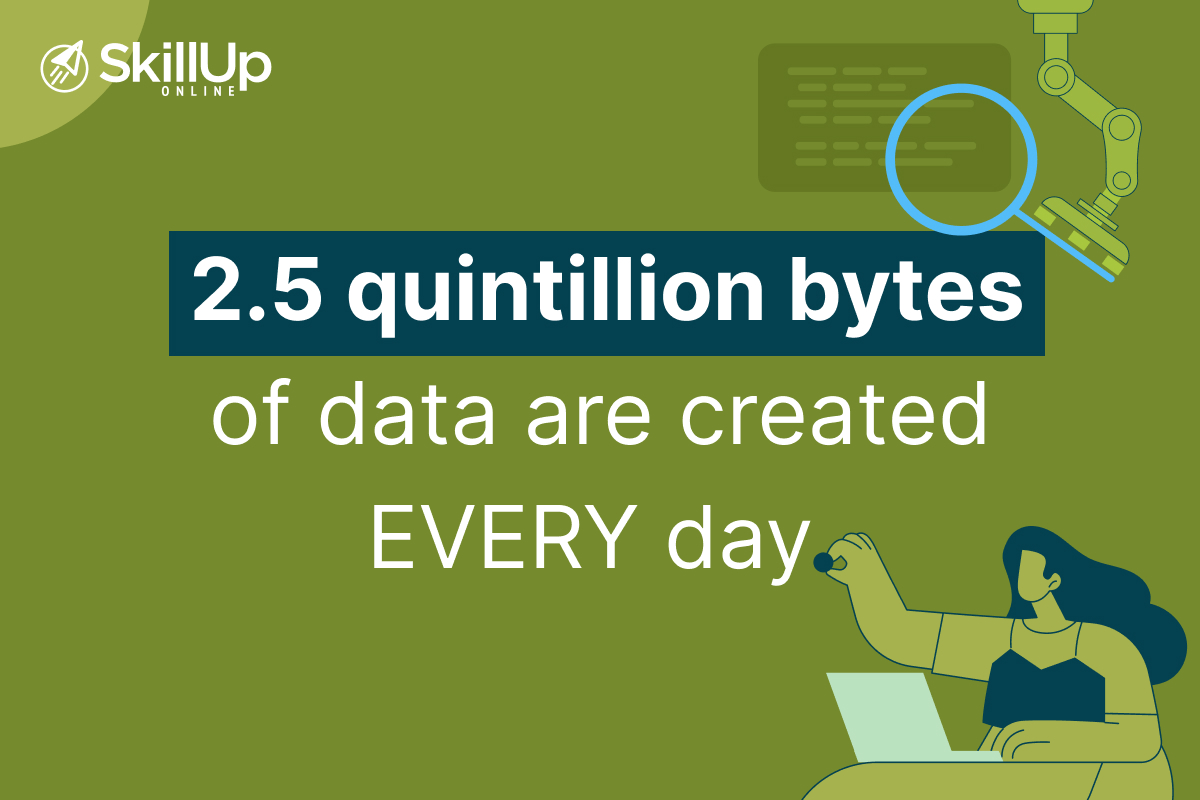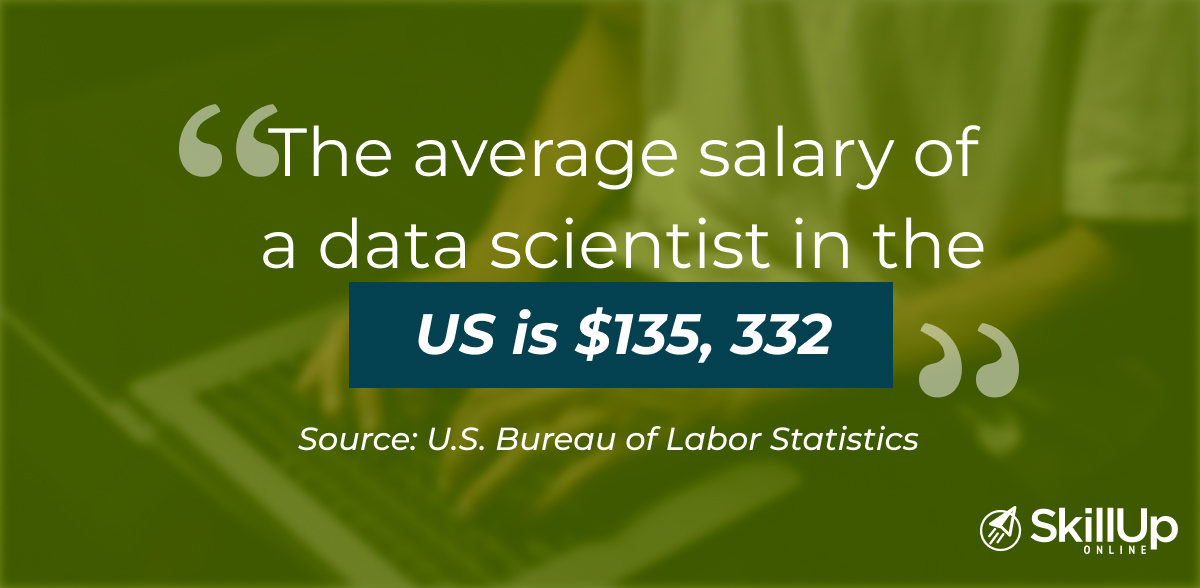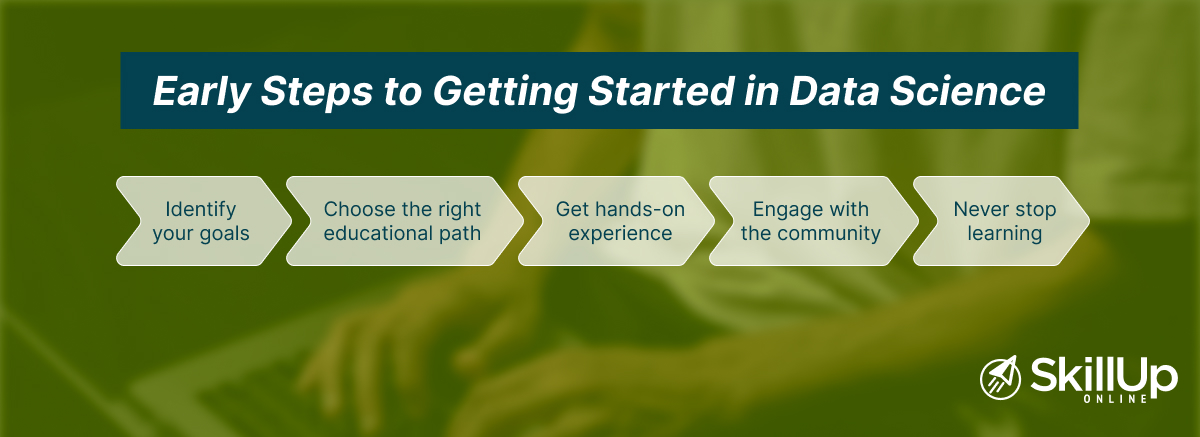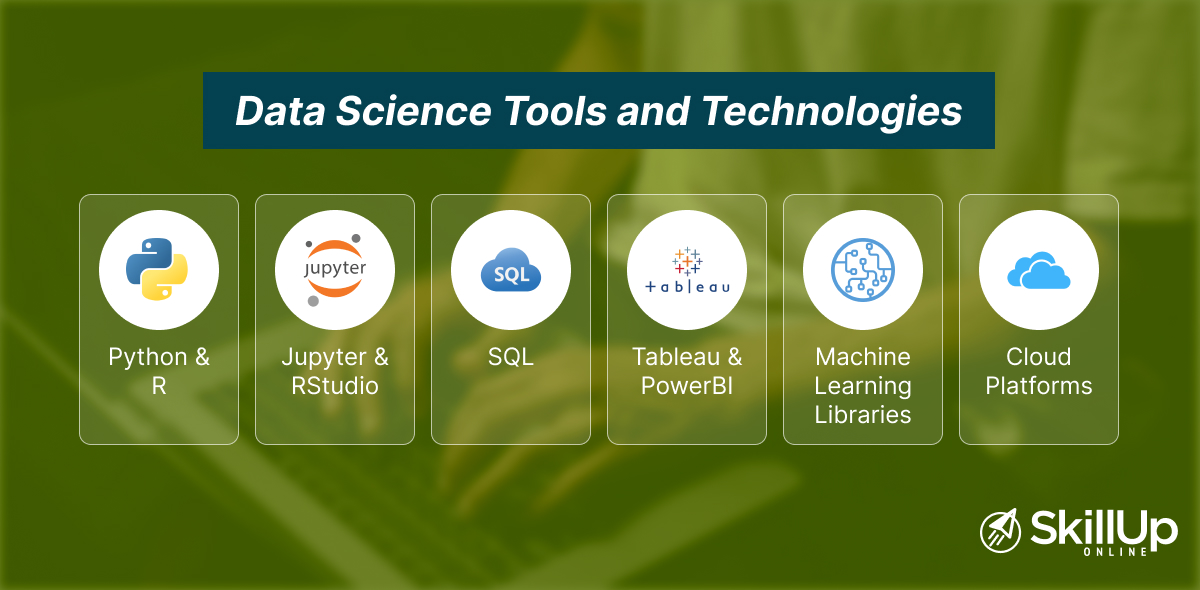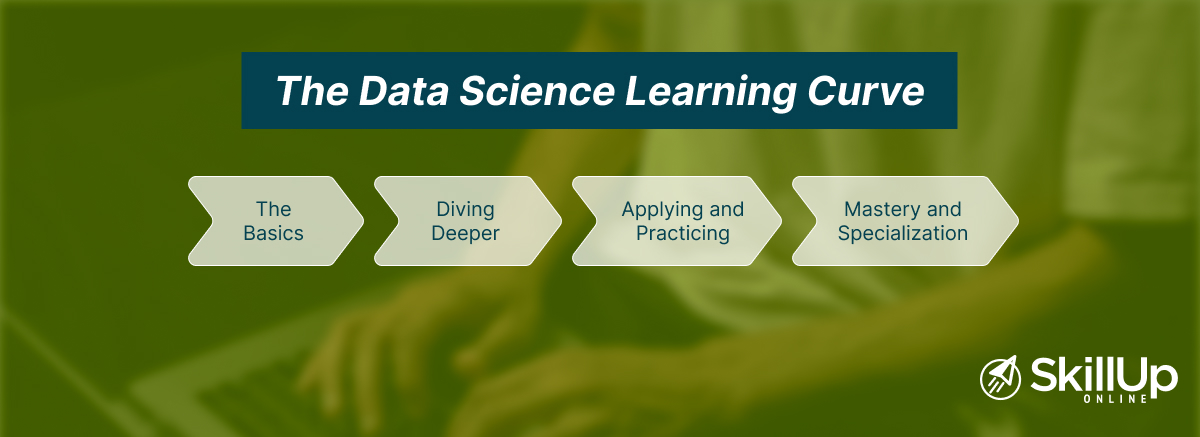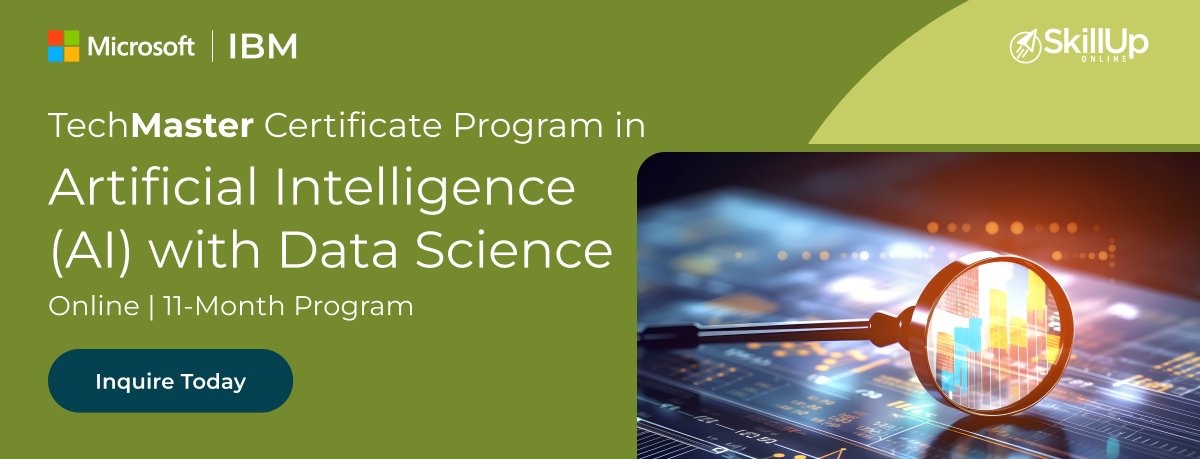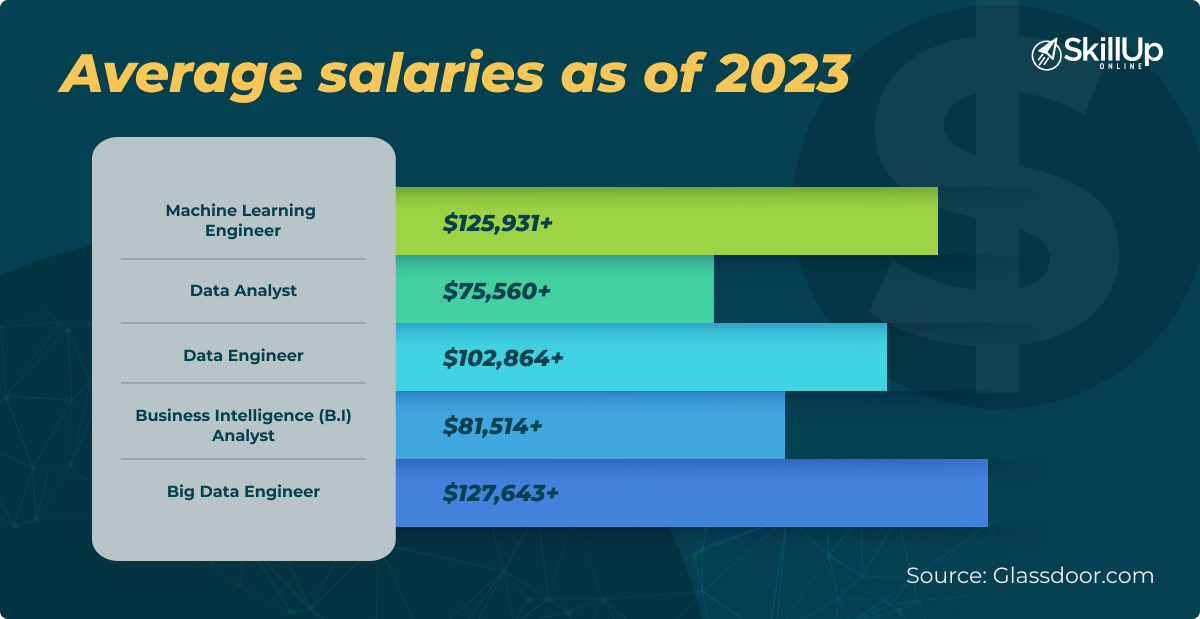In an age where every click, every view, and every purchase leave a digital footprint, the volume of data generated daily is staggering.
Consider this: 2.5 quintillion bytes of data are created every single day, and by 2025, the global datasphere is expected to grow to 175 zettabytes.
Now, these are astonishing statistics in themselves, but there’s more to them than just that. For they aren’t just numbers; they signify a paradigm shift. The emergence of data science as a discipline is now going beyond traditional boundaries, and is combining statistical analysis, technological prowess, and business acumen to derive actionable insights from data.
For career starters, graduates, switchers, and returners, this guide seeks to demystify data science. From foundational understanding to real-world applications, we aim to equip you with the knowledge and confidence you need to dive into this dynamic field.
What Is Data Science?
Data science is a multi-disciplinary field that utilizes scientific methods, algorithms, and systems to extract knowledge and insights from structured and unstructured data. To better understand what data science is and how it’s used, let’s look at how it’s applied with some real-world examples.
- E-Commerce Recommendations: Ever wondered how online shopping platforms seem to “know” what you might want to buy next? That’s data science at work. By analyzing your past purchases, search history, and the products you’ve viewed, these platforms utilize machine learning to offer tailored product recommendations to enhance your shopping experience.
- Healthcare Predictions: Hospitals and healthcare facilities harness data science to predict patient admissions, which then helps improve resource allocation. Moreover, they employ algorithms to analyze patient histories, which can lead to early diagnosis and timely interventions.
- Traffic Management: Cities use data analytics to predict traffic patterns and manage congestion. By analyzing real-time data from GPS systems and road cameras, authorities can make informed decisions to alleviate traffic bottlenecks.
- Financial Fraud Detection: Banks and financial institutions leverage data science to detect unusual activities in users’ accounts. This timely detection ensures the security of user assets and maintains the integrity of financial systems.
If these examples intrigue you, imagine what you could achieve by diving deeper into this field? SkillUp Online’s TechMaster Certificate Program in Artificial Intelligence with Data Science offers a robust curriculum that provides a hands-on understanding of real-world applications of both AI and data science.
Why Consider Data Science as a Career?
In today’s technology-driven era, data science is emerging as a rewarding opportunity for career-oriented professionals. But why is this the case?
- High Demand: As every sector has become more data-dependent, the demand for skilled data science professionals has surged. The S. Bureau of Labor Statistics predicts that employment in computer and information research science (which includes data science roles) will grow 23% from 2019 to 2029, much faster than the average for all occupations.
- Lucrative Salary Prospects: Data science is not only rewarding intellectually but also monetarily. According to Glassdoor October 2023 data, data scientists in the U.S. have an average salary of over $135,332, making it one of the top-paying jobs in the country.
- Career Flexibility: The versatility of data science is one of its strongest assets. Skills acquired in this field are transferable across sectors, from finance to healthcare and beyond, providing professionals with a diverse range of opportunities.
- Continuous Learning & Growth: The dynamic nature of data science ensures professionals are always on their toes. With the field’s rapid evolution, there’s a constant influx of new techniques and tools, promising a career that never stagnates.
For those on the fence about diving into this burgeoning field, consider this: the blend of high demand, lucrative pay, and continuous growth makes it a career worth pursuing.
Skills Needed for Data Science
Entering the realm of data science requires a unique blend of skills. From mathematical proficiency to a knack for problem-solving, here’s a breakdown of the essential skills:
Technical Expertise:
- Programming: Knowledge of languages such as Python and R is fundamental. Python, in particular, boasts libraries like Pandas and TensorFlow, which are crucial in data processing and machine learning, respectively. SkillUp Online’s Python for AI and Development Project is a great to build some practical experience for your resume.
- Statistics: The backbone of data science, statistical knowledge aids in data analysis, allowing you to extract meaningful insights from data.
- Machine Learning: With AI becoming central to data science, understanding algorithms, neural networks, and more is essential. So, it’s worth considering building your skills with SkillUp Online’s Deep Learning with TensorFlow
Business Acumen: Beyond the technical, understanding industry-specific needs and challenges ensures that the data analysis is relevant and actionable. While data science is used in equal measure, for example in both ecommerce and healthcare, the analysis points that a data analyst would be required to study would be vastly different. Understanding how each business operates will give you the knowledge to decide on the specific data points to analyse.
Data Visualization: Representing data visually using tools like Tableau or PowerBI aids in comprehending and communicating complex data insights effectively.
Soft Skills:
- Problem-Solving: The essence of data science lies in solving real-world problems using data.
- Communication: Translating complex data findings into understandable insights for non-technical stakeholders is vital.
- Curiosity: A natural inclination to question and explore data will drive innovation and deeper insights.
Self-Assessment: Are You Ready for a Data Science Journey?
Embarking on a career in data science requires a blend of technical knowledge and intrinsic qualities. Let’s assess your readiness through a series of reflective questions:
- Analytical Mindset: Do you often find yourself analyzing situations, breaking them down to understand the cause and effect? Data science thrives on such analytical thinking.
- Technical Inclination: Have you ever dabbled in programming, even if just a bit? While you don’t need to be a coding guru, some foundational knowledge can be advantageous.
- Curiosity Quotient: Are you the kind of person who’s never content with surface-level answers? A curious mind is the driving force behind meaningful data insights.
- Communication Skills: Can you explain complex concepts in simple terms? As a data scientist, you’ll often need to translate data-driven insights to non-technical stakeholders.
- Resilience: When faced with a challenging problem, do you persevere or give up? The world of data is riddled with complex challenges, and persistence is key.
Reflect on your answers. If you found yourself nodding affirmatively to most of these, you’re already on the right path. And even if you’re uncertain, remember that data science is vast. Courses like SkillUp Online’s Foundation of Artificial Intelligence and Machine Learning, are ideally suited to help you get a grip on the fundamentals so that you can explore the specialization of your choice at a later stage.
Getting Started: Your First Steps
Every grand journey starts with a single step, and in the world of data science, that step is education. Here’s how you can embark on this path:
Identify Your Goals: Before diving in, define your objective. Are you looking to change careers entirely, enhance your current profession with data science skills, or explore a new area of interest? Your goals will shape your learning trajectory.
Choose the Right Educational Path:
- Formal Education: A bachelor’s or master’s degree in data science, computer science, or a related field can provide a comprehensive foundation. It covers the theoretical and practical aspects of the domain. However, one big disadvantage of formal academic education is the lack of practical learning opportunities.
- Online Courses:For many, the flexibility of online learning is unmatched. Platforms like SkillUp Online offer a range of courses, from Deep Learning Fundamentals to specialized programs like the TechMaster Certificate Program in AI with Data Science that provide flexible learning opportunities.
Engage with the Community: Join online forums, attend workshops, or participate in webinars. Engaging with the data science community provides invaluable insights, firsthand experiences, and networking opportunities.
Hands-onExperience: Theory without practice is incomplete. Start with small projects like analyzing datasets available online. Over time, as your confidence builds, you can take on more complex challenges.
Continued Learning: The tech world evolves rapidly. Continuous learning is not just recommended but essential. Stay updated with the latest tools, techniques, and industry trends. Blogs on GitHub, for example, are an excellent resource for such updates.
Data Science Tools and Technologies
Navigating the data science landscape necessitates a toolbox packed with a variety of instruments. These tools, both software and platforms, empower professionals to derive insights, visualize data, and create predictive models. Let’s explore some of these indispensable tools:
- Python & R: At the heart of data science lies programming languages. While several languages are in use, Python and R dominate the scene due to their extensive libraries and community support.
- Jupyter & RStudio: These integrated development environments (IDEs) cater specifically to Python and R users. They offer interactive platforms to code, visualize, and document the entire data analysis process.
- SQL:Structured query language (SQL) is pivotal for data extraction and manipulation from relational databases. Understanding SQL equips professionals to interact seamlessly with large datasets stored in these databases.
- Tableau & PowerBI: Visualization tools like Tableau and PowerBI transform raw data into understandable visuals, aiding in better decision-making and insights communication.
- Machine Learning Libraries: TensorFlow, PyTorch, and Scikit-learn are among the leading libraries for machine learning. These aid in creating and deploying machine learning models efficiently.
- Cloud Platforms: With data becoming colossal, cloud platforms like AWS, Google Cloud, and Microsoft Azure offer scalable storage and computing solutions. Moreover, they provide machine learning services, simplifying model training and deployment.
Setting Up Your Learning Environment
- Start Simple: Initially, equip your toolbox with basic tools like Python, Jupyter, and SQL.
- Experiment with Real Data: Platforms like Kaggle offer datasets on varied topics. Dive in, experiment, and apply your learning.
- Stay Updated: With the tech landscape rapidly evolving, it’s vital to stay updated. Subscribing to forums, reading blogs and participating in webinars can keep you abreast of the latest tools and technologies.
The Data Science Learning Curve
Embarking on a data science journey is a 4-step process. Here is what you will need to go through:
- The Basics: This is where everyone starts – understanding core concepts, dabbling in basic programming, and getting a grasp of statistics. It might seem overwhelming at first, but remember, every data scientist once stood where you are now.
- Diving Deeper: Here, you delve into more advanced topics like machine learning algorithms, deep learning, and complex data analytics. Tools become sophisticated, and the challenges grow. But so do the rewards. SkillUp Online’s Deep Learning with TensorFlow can be an excellent guide through this phase.
- Applying and Practicing: After acquiring knowledge, it’s time for practical application. This phase often involves working on projects, analyzing real-world data, and refining skills. It’s about reinforcing and solidifying what you’ve learned.
- Mastery and Specialization: Reaching the pinnacle means you’ve not only grasped the vastness of data science but have also dived deep into a specific area of specialization, be it neural networks, natural language processing, or another niche field.
Overcoming Common Challenges
Take heart, if all this seems too much take on, there are proven strategies for overcoming such challenges:
- Feeling Overwhelmed: The scale of data science can be daunting. It’s essential to remember that you don’t need to learn everything at once. Focus on foundational concepts first and take it step by step.
- Imposter Syndrome: Many budding data scientists feel they don’t belong or aren’t good enough. This is a common sentiment, even among seasoned professionals. Celebrate small achievements and remember every expert was once a beginner.
- Staying Motivated: Like any extensive learning journey, there might be moments of doubt or stagnation. Join communities, find mentors, or engage with peers. Surrounding yourself with a support system can reinvigorate your passion.
Real-World Data Science Projects
In the realm of data science, theory and practical application go hand-in-hand. Diving into real-world projects not only solidifies understanding but also showcases your skills to potential employers. Here’s why hands-on experience is paramount and how you can get started:
- Importance of Hands-On Experience
- Skill Application: Real-world projects allow you to apply the techniques and theories you’ve learned, ensuring deeper comprehension.
- Problem-solving: Every dataset comes with its unique challenges, helping hone your problem-solving prowess.
- Portfolio Building: For those eyeing a career in data science, a strong portfolio of projects can be a decisive factor during job interviews.
- Where to Find Datasets
- Kaggle: A favorite among data enthusiasts, Kaggle offers a plethora of datasets across domains, from healthcare to entertainment.
- UCI Machine Learning Repository: This acclaimed repository provides datasets specifically curated for machine learning.
- Government Databases: Many governments, including the U.S., have open data platforms where datasets related to various sectors are available for public use.
- Conceptualizing Project Ideas
- Predictive Modeling: Use historical data to predict future trends. For instance, predicting housing prices based on past sales and economic indicators.
- Classification: Categorize data into different classes. An example is email filtering – distinguishing between spam and legitimate emails.
- Recommendation Systems: Similar to how streaming platforms recommend shows or e-commerce sites suggest products based on user behavior.
As you dive into these projects, remember to document your process, challenges faced, and solutions devised. Highlighting these in a portfolio showcases not just your technical skills but also your analytical thinking.
Mentors and Communities
As with any profound journey, the path to data science mastery is smoother with guidance and companionship. Mentors and communities play a pivotal role in this regard, offering insight, encouragement, and invaluable networking opportunities.
- The Value of Mentorship
- Guidance: A mentor, having trodden the path you’re embarking upon, can provide direction, helping you navigate challenges and making learning more efficient.
- Feedback: Constructive feedback on projects or concepts ensures continuous improvement and growth.
- Networking: Mentors often act as bridges, introducing you to professionals, opportunities, and resources within the industry.
- Communities: A Treasure Trove of Resources
- Shared Learning: Communities, be it online forums or local meetups, are platforms where knowledge is exchanged freely. You can learn from peers, share your insights, and even collaborate on projects.
- Staying Updated: With the dynamic nature of tech, staying current is crucial. Communities often discuss the latest trends, tools, and breakthroughs.
- Opportunities: Job postings, internships, workshops, and seminars – communities often serve as hubs for such opportunities.
- Engaging with the U.S. Data Science Scene
- Local Meetups: Many U.S. cities host regular data science meetups, offering networking and learning opportunities.
- Online Forums: Platforms like Data Science Central, Stack Overflow, and Reddit have active data science communities where discussions are rich and varied. have active data science communities where discussions are rich and varied.
Remember, while self-study is commendable, leveraging the collective knowledge of a community can accelerate your growth. And in the realm of data science, where collaboration is often key, engaging with mentors and communities isn’t just beneficial – it’s essential.
Choosing the Right Path for You
Navigating the world of data science might feel like exploring a vast landscape with diverse terrains. Each terrain or specialization offers a unique experience. Here’s how you can chart your course:
Reflect on Your Interests
- Deep Dive or Broad View: Do you wish to master a specific niche or aim for a broader understanding? Your inclinations will steer your journey.
- Industry Affinity: Are you drawn to sectors like healthcare, finance, or e-commerce? Data science roles can differ significantly across industries.
Consider the Various Areas within Data Science
- Machine Learning Engineer: Dive into the world of algorithms and models. Responsibilities include developing predictive models, fine-tuning algorithms, and ensuring their real-world applicability. This role suits those who enjoy sifting through data patterns and bringing them to life through machine learning.
- Data Analyst: Serves as the bridge between raw data and actionable insights. Analyze vast datasets, uncover patterns, and present findings in a manner that drives decision-making. Ideal for individuals with a keen analytical mindset coupled with effective communication skills.
- Data Visualization Expert: Blend the realms of art and science. Transform complex data insights into visually compelling stories using tools like Tableau or PowerBI. A perfect fit for those with both technical prowess and a creative streak. A perfect fit for those with both technical prowess and a creative streak.
- Data Engineer: Keep the gears of the data world turning smoothly. Focus on the backend processes of data acquisition, storage, and retrieval. Develop and maintain the architecture (like databases and large-scale processing systems), pipelines, and data sets data scientists use. It’s ideal for professionals who enjoy building robust, scalable systems.
- Natural Language Processing Specialist: Delve deep into the world where linguistics meets technology. Work on voice recognition systems, chatbots, or sentiment analysis models. Ideal for those fascinated by the interplay of language and tech.
- Business Intelligence Developer: Transform data into actionable business strategies. This role focuses on designing and developing strategies to assist business processes and decision-making. It’s well-suited for those who can combine data skills with business acumen.
Seek Guidance: Engage with mentors and professionals. Get a feel for their day-to-day roles and challenges.
Stay Adaptable: The dynamic nature of technology means that today’s niche can become tomorrow’s mainstream. While deep expertise is invaluable, adaptability ensures sustained relevance.
Remember, your unique path in data science will be fueled by a blend of passion, aptitude, and market opportunities. With dedication and the right guidance, success is not just a possibility – it’s a given.
SkillUp Online, with its rich repository of courses, mentorship opportunities, and a vibrant community, is here to guide, support, and help you on your way. Whether you’re taking your first step or your hundredth, remember that every step counts, every challenge is a learning curve, and every success, no matter how small, is a testament to your passion and perseverance.
If you would like to know more about how you can build the necessary skills and get started in data science, contact our Learner Support Team at [email protected]. They will be more than happy to guide you on your next steps.
SkillUp Online
